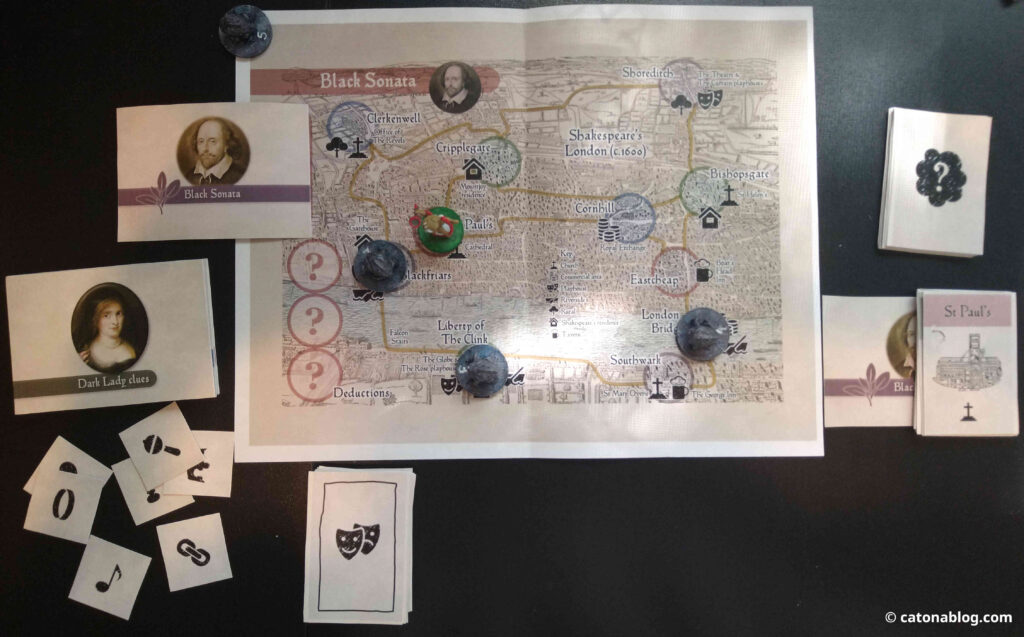
Sep 4th, 2023 Monday Sunny
I recently tried my first “print-and-play” game – black sonata.
It is a hidden movement deduction solo game. The goal is to try to trace down the whereabout of the dark lady, a figure in Shakespear’s London, and reveal her identity. I generally like games with a deduction component, and the print-and-play version is completely free, so why not check it out?
The game looked confusing when I tried to read the instructions and set it up for the first time, but after one play-through, I think I understand the mechanisms behind it. I attempted it a second time, only to realize that – either I must be interpreting some rules incorrectly, or the game has a fatal flaw – that it is pretty much unwinnable. How could that be?
“If there is an issue in the game design, someone else must have encountered it too.” With this thought in mind, I searched online for comments, video demonstrations, and rule clarifications. To my surprise, most people had an enjoyable gaming experience, and some even found it too easy (at least the training/easy mode). A little more digging yielded what I was looking for: I had missed one important rule in the game (I reviewed the printed instruction again, and the rules as written were consistent with what other players have done) that made victory impossible. ??
Well, at least NOW I know why it was so frustrating for me. I am confident I can win it next time. ?
Having solved this “mystery”, I start to contemplate another one – black sonata is technically a board game, “jeu de societe” in French, which means “game of company”. It is like those card games (e.g. bridge) popular among the genteel class in Europe at one point, a pastime to entertain people in a leisurely social setting. As the genre name suggests, board games are meant to be played with other people. It is not uncommon for friendship to develop over a card table, and negotiation of businesses to be handled over a few rounds of Whist.
Then, why is there a solo game? ?
Perhaps many of us have times when all we want is to tackle a good puzzle, where all the reasoning happens in our head without the need to verbalize or communicate with another soul in any way. It is like working out those challenging mathematical problems in school – the a-ha moments that generate a sense of accomplishment, just for ourselves. We definitely collaborate with others, but we also want to feel independently competent.
Perhaps for adults whose daily jobs involve lots of human interactions (and those living with people in the same household), we might want a little breathing space to be alone. We may seek inward for important answers concerning our happiness, meaning of life, and where to take the next step on this journey. No matter how close we might feel towards friends/family around us, it is essential that we isolate ourselves from all the influences when listening to our heart. After all, nobody knows us better – the seed of truth is often already inside us, yet it takes some insight to discover it.
Perhaps sometimes we want to keep a distance from others, for various reasons, and we still want something to do during that time – something mentally stimulating, relaxing, and not another house chore 😉 A “solitaire” game seems to be the perfect fit.
I am certainly happy to embrace another opportunity to play a solo game some day. 🙂